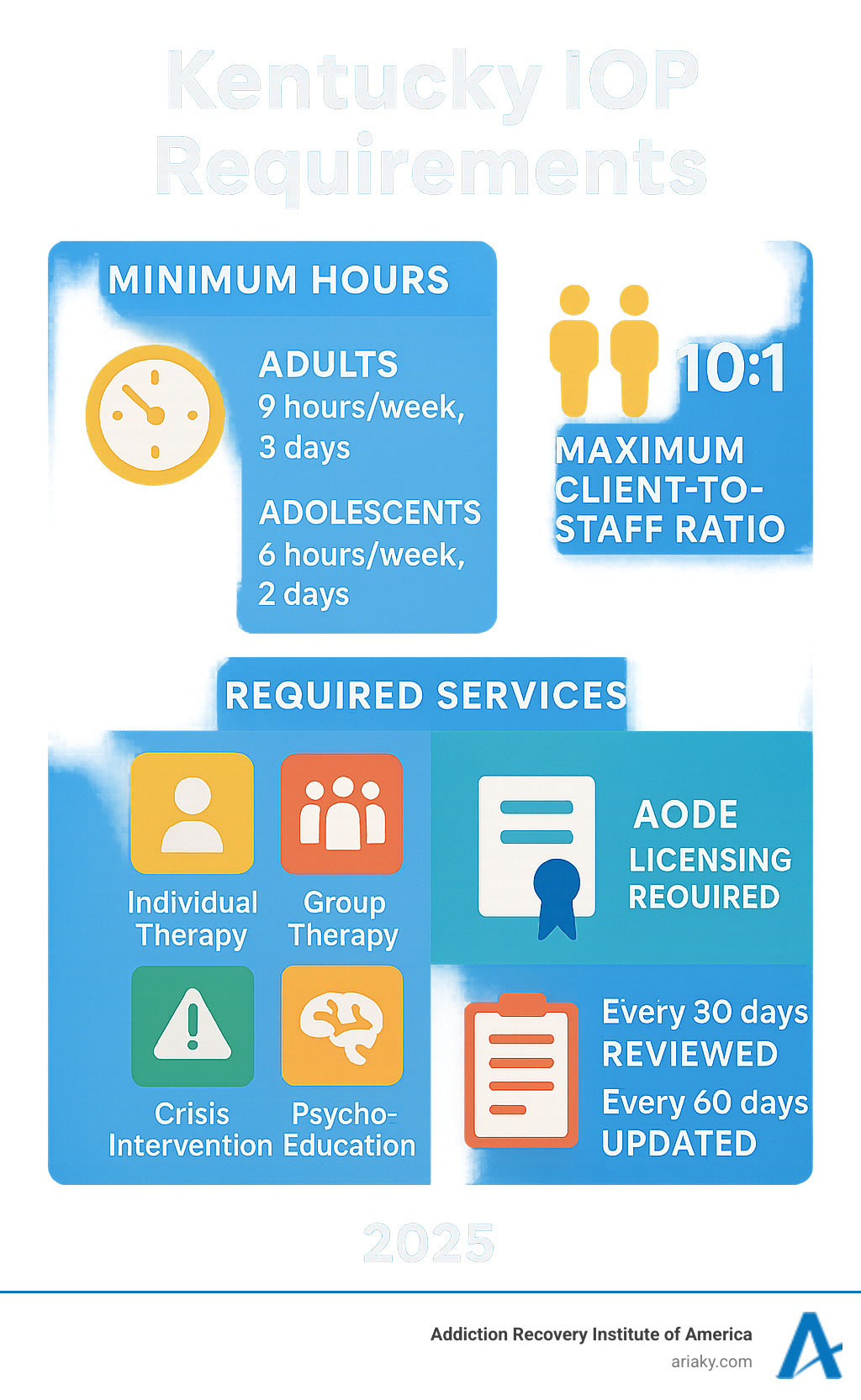Understanding Kentucky’s IOP Regulatory Framework
Intensive outpatient program regulation kentucky can feel overwhelming when you’re trying to find quality care for yourself or a loved one. The good news? Kentucky has clear rules that protect patients and ensure programs meet basic standards.
Quick Answer: Kentucky’s Key IOP Regulations
- Adult IOPs: Minimum 9 hours per week across 3+ days
- Adolescent IOPs: Minimum 6 hours per week across 2+ days
- Staff Ratio: Maximum 10 clients per staff member
- Licensing: Must hold valid AODE (Alcohol and Other Drug Entity) license
- Services Required: Individual therapy, group therapy, crisis intervention, psycho-education
- Staff Requirements: Licensed professionals with background checks
- Plan Reviews: Treatment plans reviewed every 30 days, updated every 60 days
Kentucky’s regulations exist because not all IOPs are created equal. While legitimate programs help people rebuild their lives, some operators have exploited vulnerable patients through billing fraud and substandard care.
In 2022, a Lexington-based IOP was shut down after a state audit revealed they were billing Medicaid for therapy sessions that never happened. Staff had forged attendance sheets and logged sessions that were never held.
These regulations matter because they’re your roadmap to finding real treatment versus programs that exist mainly to collect insurance payments. Understanding the rules helps you ask the right questions and spot red flags before enrolling.

What Kentucky Law Says: Core IOP Requirements
When you’re searching for quality addiction treatment, understanding intensive outpatient program regulation Kentucky isn’t just helpful—it’s essential for your safety and recovery success. The Kentucky Administrative Regulations (KAR) create a protective framework that ensures every IOP meets strict standards for care.
Think of these regulations as your safety net. They’re not bureaucratic red tape; they’re the difference between getting real help and falling victim to programs that put profits over people.
Every facility offering substance use disorder treatment must earn AODE (Alcohol and Other Drug Entity) certification. This isn’t handed out easily—programs must prove they can deliver quality care before they’re allowed to treat patients. At Addiction Recovery Institute of America, we’re proud to maintain this certification because it represents our commitment to doing things the right way.
The regulations also protect your fundamental rights as a patient. You have the right to quality care, privacy protection under HIPAA, and a voice in your treatment decisions. These aren’t just nice ideas—they’re legally required standards that every legitimate program must follow.
More info about our Kentucky Addiction Treatment Therapy Programs
Defining the Structure: Hours and Services
Kentucky clearly defines “intensive outpatient” to separate real IOPs from programs that don’t deliver the necessary support.
For adults, a legitimate IOP must provide at least 9 hours per week spread across no fewer than 3 days. Adolescents receive at least 6 hours weekly across 2 or more days. These aren’t arbitrary numbers—they’re based on research showing how much structure people need to build lasting recovery skills.
But it’s not just about hours. The time must be filled with proven therapeutic activities like group therapy, individual counseling custom to your needs, and psycho-education to help you understand addiction and recovery.
Medication-Assisted Treatment (MAT) must be available when clinically appropriate. This evidence-based approach combines counseling with FDA-approved medications to reduce cravings and support long-term recovery. Programs must also provide crisis intervention services—because recovery doesn’t follow a 9-to-5 schedule.
The client-to-staff ratio can’t exceed 10:1. This ensures you receive individual attention, which Kentucky’s regulations guarantee.
Kentucky’s Intensive Outpatient Program Regulation for Staffing and Licensing
The people treating you matter—a lot. Kentucky recognizes this by setting strict standards for who can work in IOPs and what qualifications they must have.
Program directors can’t just be anyone with good intentions. They must be psychiatrists, physicians, licensed psychologists, licensed clinical social workers, or similar licensed professionals. They also need either a master’s degree in business administration or a human services field, or a bachelor’s degree with specific experience in the field.
All licensed professionals providing your care must meet state requirements. This includes licensed psychologists, clinical social workers, professional counselors, physicians, psychiatrists, advanced practice registered nurses, and licensed clinical alcohol and drug counselors. When behavioral health professionals under supervision provide services, their work must be co-signed by a supervising professional within 30 days.
All staff with client contact undergo criminal background checks upon hiring, and 25% of personnel face random checks annually. This ensures your safety during a vulnerable time.
Accreditation requirements add another layer of protection. Programs must become accredited by nationally recognized bodies like the Joint Commission, CARF, or COA within one year of initial licensure. This means outside experts regularly review and approve the program’s standards.
Kentucky Administrative Regulations, Chapter 1, Section 908 KAR 1:370
More info about our Rehab Facilities in Kentucky
The Plan of Care and Client Rights
Your recovery journey is unique, and Kentucky’s intensive outpatient program regulation Kentucky ensures your treatment reflects that. Every client must receive an individualized, written plan of care—not a cookie-cutter approach, but a roadmap designed specifically for your needs and goals.
This plan must include measurable goals to track your progress, such as attending a certain number of sessions or developing specific coping skills. These goals give you something tangible to work toward.
Regular plan reviews happen at least every 30 days, with updates every 60 days or sooner if needed. Recovery isn’t a straight line, and your treatment plan should evolve as you grow and face new challenges. You also have the right to provide input into your plan—after all, it’s your recovery.
Your privacy rights are rock-solid. HIPAA regulations and 42 C.F.R. Part 2 protect your information, ensuring that your treatment remains confidential. You must give informed consent before treatment begins, meaning you understand what services you’ll receive and what to expect.
Every legitimate program has clear grievance procedures that let you voice concerns without fear of retaliation. You also have the right to access your own records and receive copies when needed. These aren’t just nice policies—they’re legal requirements that protect your dignity and autonomy.
When programs respect these rights, they create an environment where healing can happen. Trust, transparency, and respect aren’t luxuries in treatment—they’re necessities for lasting recovery.
More info about our Outpatient Treatment Program (KY)
The Reality on the Ground: Effectiveness vs. Exploitation

The story of intensive outpatient program regulation Kentucky isn’t just about rules on paper – it’s about real people whose lives hang in the balance. Every day, Kentuckians walk into IOPs hoping for a fresh start. Some find exactly what they need. Others, sadly, encounter programs that care more about profit than people.
This reality check matters because understanding what works (and what doesn’t) helps you spot the difference between genuine treatment and exploitation. The regulations exist for good reason, but they’re only as strong as the people who follow them.
More info about Substance Abuse Treatment Kentucky
Measuring Success: When IOPs Work
When IOPs follow Kentucky’s regulations and truly focus on recovery, the results speak for themselves. These programs create structured environments where people can heal while keeping their jobs, staying with their families, and maintaining their daily responsibilities.
The numbers from Kentucky’s ethical IOPs are encouraging. Program completion rates hover around 55-65%, which matches national averages and shows that most people who start treatment see it through. But completion is just the beginning of the story.
Six months after finishing an IOP, 67% of participants in Kentucky’s Treatment Outcome Study were staying sober from drugs and alcohol. Even more impressive, 71% had clean drug screens. These aren’t just statistics – they represent thousands of Kentuckians rebuilding their lives.
The ripple effects go far beyond sobriety. Employment rates jumped from 38% at intake to 64% after treatment. When you’re not spending your day chasing substances or dealing with withdrawal, you can actually show up for work and build a career.
Mental health improvements are equally dramatic. Depression and anxiety symptoms dropped by nearly 50% among people who completed their programs. This makes perfect sense – addiction and mental health issues often feed off each other, so treating both together creates real healing.
Perhaps most telling is that stable housing increased by 26% among participants. Having a safe place to call home is foundational to recovery, and effective IOPs help people achieve this basic need.
Tasha, a former client, puts it simply: “IOP gave me a chance to stay with my kids while getting help. I finally learned how to deal with my trauma instead of numbing it.” Stories like hers happen every day in programs that prioritize people over profit.
Red Flags and Failures: When IOPs Don’t Work
Unfortunately, not every program lives up to Kentucky’s standards. Some operators have turned addiction treatment into a money-making scheme, leaving vulnerable people worse off than when they started.
The warning signs are often obvious once you know what to look for. Billing irregularities plague the worst programs. In 2022, a Lexington IOP was shut down after auditors found they were billing Medicaid for therapy sessions that never happened. Staff had forged attendance sheets and logged fake sessions – all while real patients went without proper care.
Even more disturbing are unethical referral practices that treat people like commodities. In Northern Kentucky, operators recruited people from jails and court programs, then shuffled them into IOPs and unregulated sober homes. Some residents were actually encouraged to relapse because continued substance use meant continued Medicaid billing.
Unlicensed facilities are another red flag. Some rural Kentucky “IOPs” operated without proper certification while billing over $400,000 for services that amounted to watching the same video three times a week in a church basement. As one former participant told reporters: “They ran it like a check-in center, not treatment. Half the guys were high during group.”
The human cost shows up in the numbers. Programs that cut corners see high re-arrest rates – in Jefferson County, 27% of IOP completers were arrested again within 12 months. Relapse rates also spike when programs don’t provide real therapeutic support.
A former client captured the problem perfectly when they told investigators: “They made more money if we kept coming back.” This twisted incentive – where patient failure equals program profit – represents everything wrong with exploitative treatment.
Systemic Loopholes and Barriers
Why do these problems persist despite Kentucky’s regulations? The answer lies in systemic gaps that allow bad actors to slip through the cracks.
Lack of state oversight tops the list. While the rules exist, insufficient funding for enforcement means audits often happen only after someone gets hurt. It’s reactive rather than preventive, which doesn’t help the people who need protection most.
Medicaid loopholes create perverse incentives. The combination of high demand for treatment and generous insurance coverage has attracted operators who see dollar signs instead of human beings. When oversight is weak, these loopholes become highways to exploitation.
Transportation issues plague rural Kentucky, where distances to quality programs can be overwhelming. Without reliable transportation, people often settle for whatever’s closest – even if it’s not properly licensed or effective.
Rural access challenges go beyond just getting there. Many remote areas simply don’t have enough qualified providers or facilities. This shortage pushes people toward less reputable options or leaves them without treatment entirely.
Poor integration with mental health services creates another barrier. Since addiction and mental health issues often occur together, programs that only address one piece of the puzzle set people up for failure. True recovery requires comprehensive care.
Insurance gaps still exist despite expanded coverage. High deductibles, limited networks, and coverage restrictions can make quality treatment financially impossible for many Kentuckians.
These barriers mean that even people with the best intentions can end up in programs that don’t serve their needs. Understanding these challenges helps you steer around them and find the quality care you deserve.
A Guide to Intensive Outpatient Program Regulation in Kentucky

Finding the right treatment shouldn’t feel like navigating a maze. When you’re searching for quality care, understanding intensive outpatient program regulation Kentucky becomes your compass. These regulations aren’t just bureaucratic red tape – they’re your protection against programs that put profit before people.
The reality is that some programs excel at providing life-changing care, while others exist mainly to collect insurance payments. Your job is to tell the difference. The good news? Once you know what to look for, spotting quality becomes much easier.
Think of this as your detective toolkit. A little upfront research can save you months of frustration and put you on the path to real recovery.
More info about our Kentucky Substance Abuse Treatment Center
How to Verify a Program’s Legitimacy
Before you walk through any program’s doors, do your homework. Legitimate programs welcome questions about their credentials – it’s the sketchy ones that get defensive or evasive.
Start with the AODE license check. Every legitimate IOP in Kentucky must hold a valid Alcohol and Other Drug Entity license from the Kentucky Cabinet for Health and Family Services. You can verify this through the Cabinet’s Office of Inspector General or their online database. No license? Walk away.
Next, verify accreditation online. Look for seals from recognized organizations like the Joint Commission, CARF, or COA on their website. But don’t stop there – actually visit the accrediting body’s website to confirm the accreditation is current and real. Fake seals are more common than you’d think.
Don’t be shy about asking for staff credentials. A quality program will proudly share information about their program director’s qualifications and clinical staff licenses. Licensed professionals should be able to provide this information without hesitation. If they can’t or won’t, that’s a red flag.
Inquire about their treatment plan process. How do they create individualized plans? When are they reviewed? How do they involve you in the process? A legitimate program will have clear answers and involve you as a partner in your care.
Finally, review their patient rights policies. Ask to see their confidentiality policies, grievance procedures, and how they handle client concerns. Quality programs have these clearly outlined and easily accessible.
If any program seems reluctant to provide this basic information, trust your instincts. Your recovery is too important to leave to chance.
More info about our Kentucky Drug & Alcohol Rehab Programs
Key Indicators of a High-Quality IOP
Meeting minimum regulations is just the starting point. The best IOPs go far beyond basic requirements to provide comprehensive, person-centered care that actually works.
Evidence-based practices are non-negotiable. The program should use therapeutic approaches backed by scientific research, like Cognitive Behavioral Therapy (CBT), Dialectical Behavior Therapy (DBT), and motivational interviewing. If they can’t explain their treatment methods or rely solely on outdated approaches, keep looking.
Integrated dual-diagnosis care is crucial since addiction rarely travels alone. Mental health disorders like depression, anxiety, or trauma often fuel substance use. Quality programs treat both simultaneously rather than shuffling you between different providers.
Access to Medication-Assisted Treatment (MAT) can be life-saving for certain addictions. If clinically appropriate, the program should offer or facilitate access to medications that reduce cravings and withdrawal symptoms, combined with counseling and behavioral therapies.
Peer recovery coaching adds a powerful dimension to treatment. People who’ve walked the recovery path themselves bring unique insight and hope. They understand the struggle in ways that textbooks can’t teach.
Comprehensive aftercare planning should start on day one, not your last week. Recovery extends far beyond program completion, and quality IOPs help you build a robust support network and relapse prevention strategy for the long haul.
Family involvement recognizes that addiction impacts everyone who loves you. The best programs offer family therapy or educational components to heal relationships and build healthy support systems.
At Addiction Recovery Institute of America, we integrate all these elements into our programs across Kentucky. We believe recovery happens best when care is custom to your unique needs and circumstances.
Frequently Asked Questions about Kentucky IOP Regulations
We get it – choosing the right treatment program can feel overwhelming, especially when you’re trying to steer regulations and requirements. You’re not alone in having questions! Here are the most common ones we hear about intensive outpatient program regulation Kentucky.
What are the minimum weekly hours for an IOP in Kentucky?
This is probably the most important question because it defines what makes a program “intensive” versus regular outpatient care.
For adults, Kentucky requires at least nine (9) hours of therapeutic services per week, spread across no less than three (3) days per week. Think of it this way: you might attend sessions Monday, Wednesday, and Friday for three hours each day.
For adolescents, the requirement is slightly different – at least six (6) hours per week across no less than two (2) days per week. This recognizes that younger people often have school and other developmental needs to balance.
The whole point of this intensity is to provide structure and support that goes way beyond traditional outpatient care (which might be just one hour per week). It’s designed for people who need significant therapeutic intervention but don’t require round-the-clock supervision.
Many of our clients find this level of care perfect when they’re stepping down from residential treatment or need more support than standard outpatient therapy can provide.
How can I check if an IOP is licensed in Kentucky?
This is such a smart question to ask – and we’re glad you’re thinking about it! Verifying a program’s legitimacy should be your first step.
The Kentucky Cabinet for Health and Family Services oversees all addiction treatment licensing. You can contact their Office of Inspector General directly to verify that a program holds a valid AODE (Alcohol and Other Drug Entity) certification.
Most legitimate programs will also display their AODE certification prominently on their website or in their facility. Look for accreditation seals from organizations like the Joint Commission, CARF, or COA as well. These aren’t required by law, but they show a program goes above and beyond minimum standards.
Here’s a tip: if a program seems hesitant to share their licensing information or gets defensive when you ask, that’s a red flag. Reputable programs are proud of their credentials and happy to share them.
What qualifications are required for IOP staff?
Kentucky doesn’t mess around when it comes to staff qualifications – and that’s great news for you as a client.
All licensed professionals providing IOP services must hold proper credentials. This includes licensed psychologists, licensed clinical social workers (LCSW), licensed professional clinical counselors, licensed clinical alcohol and drug counselors, physicians, psychiatrists, and advanced practice registered nurses (APRNs).
The program director has even stricter requirements. They must typically hold a master’s degree in a human services field and have relevant supervisory experience. They also need to be a licensed professional themselves – often a psychiatrist, physician, or LCSW.
Every IOP must also ensure access to psychiatric consultation and have a psychiatrist, physician, or APRN available for medication prescribing and monitoring. This means you’re not just getting counseling – you have access to comprehensive medical oversight.
One thing that really sets Kentucky apart is the mandatory criminal background checks. All staff with client contact undergo background checks when hired, and the state randomly checks at least 25% of personnel annually. This helps ensure you’re in a safe, trustworthy environment.
These requirements exist to ensure you receive professional, qualified care during a vulnerable time.
Finding a Compliant and Effective IOP in Kentucky
You’ve made it this far, which tells us something important about you: you’re serious about finding real help. Not just any program, but one that actually works and treats people with dignity.
The journey through intensive outpatient program regulation Kentucky might feel overwhelming, but here’s the truth – these rules exist to protect you. Every regulation we’ve discussed, from those 9-hour minimum weekly requirements to mandatory staff background checks, was written because someone, somewhere, needed that protection.
The regulations give you power. When you know that Kentucky requires IOPs to maintain specific client-to-staff ratios, you can ask tough questions. When you understand that treatment plans must be reviewed every 30 days, you can hold programs accountable. When you know staff must be licensed professionals, you can verify credentials before trusting someone with your recovery.
We’ve seen the best and worst of what’s out there. The programs that genuinely change lives through evidence-based practices, integrated dual-diagnosis care, and comprehensive aftercare planning. We’ve also exposed the darker side – the billing fraud, the “body-brokering,” and the facilities that prioritize profit over people.
Your due diligence matters more than you might think. That phone call to verify an AODE license? It could save you from months in a program that’s more interested in your insurance card than your sobriety. Those questions about staff qualifications and accreditation? They’re your shield against exploitation.
The right IOP should feel like a partnership, not a transaction. You should feel heard during treatment planning sessions. Staff should be transparent about their credentials and eager to explain how they’ll support your recovery. The program should balance structure with flexibility, giving you the intensity you need while respecting your life outside treatment.
At Addiction Recovery Institute of America, we understand that choosing treatment is both hopeful and scary. That’s why we’re proud to be an accredited, AODE-certified addiction rehab center that follows every regulation not as a burden, but as a foundation for ethical care. Our individualized programs across Kentucky, from detox through IOP, are built on the principle that lasting sobriety comes from genuine, compassionate treatment.
Recovery is possible. But it starts with finding a program that’s as committed to your healing as you are. Don’t settle for anything less than compliant, effective, and genuinely recovery-centered care.
Take the next step with a compliant Intensive Outpatient Program (IOP) in Kentucky


